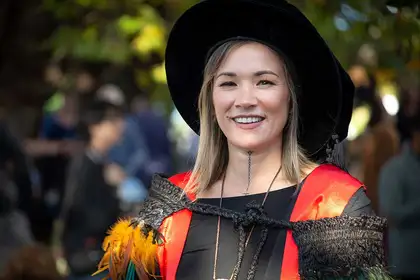
For her PhD thesis, Dr Teah Carlson, Te Whānau-ā-Apanui, Ngāti Porou, Waikato-Tainui, developed and evaluated a health literacy framework designed specifically for Māori.
Dr Carlson, from Massey University’s SHORE & Whāriki Research Centre, set out to identify gaps in health literacy approaches through interviews with Māori. “My research is about reclaiming health literacy as a space for Māori to be themselves, a space shaped by people, whānau, and communities,” she says.
The study developed a kaupapa Māori health literacy evaluation framework. It was shaped by insights from semi-structured interviews with selected Māori health literacy experts and Ngāti Porou Hauora staff, the Māori health provider implementing the intervention.
Dr Carlson says Ngāti Porou Hauora had input into the evaluation framework, the consultation processes and methodology, and helped define the expectations of the intervention.
“In the final dissemination hui, the feedback and comments were overwhelmingly positive. Attendees, from community representatives to staff and senior management, discussed the research, and particularly the framework, in terms of how it could inform their professional practice and guide the implementation of effective health literacy within Ngāti Porou Hauora,” Dr Carlson says.
“The chief executive asked for permission to consider the framework as an evidence-based contribution in developing a ‘Ngāti Porou model of care’. A small working group was convened to start work on distilling the model, and I have been invited to contribute to these developments. I see this as an opportunity to support the interpretation and uptake of the framework and further honour the voices of Ngāti Porou patients, whānau, and communities.”
“In the nine years I have been involved in this area of medication use with Māori patients and whānau who have chronic disease, I have presented at various hui, conferences, and workshops and always hear stories of heartache, struggle, and sorrow in relation to the healthcare system and services,” Dr Carlson says.
“To bring about change, we need to examine practices embedded in broader social narratives and recognise issues of equity, equality, and empowerment. I want to transform health literacy at all levels, which requires the reconfiguration of power relations in line with current debates about decolonisation.
“The transformation of health literacy will involve investing in cultural safety and competency training, applying new standards of practice, and ensuring internal and external Māori involvement at all levels of engagement,” Dr Carlson says.
“Of the participants and whānau involved in my research over the years, more have passed away than are still living. I always wanted this research to highlight the realities faced by my people, our people, and to contribute towards actionable and transformative change.”
Dr Carlson says one of the most powerful stories in the research was shared by a kaumatua (Māori elder) whose wife was given an overdose of her medication and subsequently died. He told her: “Well, I didn’t know half of what the doctor’s word was all about until recently… We were just ignorant of the fact, we just accepted ... So, you get out there, girl, and get the word out, get them to know how it works and what it’s all about, get these doctors and boss man [managers] on board too. It’s not good enough not knowing anymore.”
Dr Carlson has worked as a Kaupapa Māori Researcher and Evaluator at Massey’s SHORE & Whāriki Research Centre for the last two years. “My mahi [work] mainly uses qualitative methods, strategy and evaluation. Most of my work involves working with, for, and by Māori communities where collaboration, partnership and participatory community action are key to the research development, process and outcomes.”
Her research not only encompassed words on a page, but it included practices of action research, and creative methologies such as live-painting, drawing, poems, diary entries, songs and stories.
“My thesis is presented in a way that encompasses all these forms of communication – most visible is the developing art piece I reference through the chapters. This reference reflects what I do when I present my research.
“I paint while I speak, using liquid chalk on black card. I begin with an abstract image that appears visually dislocated, fluid, and non-complementary to the themes on which I present; however, this process is purposeful. I want the audience to strive to make sense of the image, to try and ‘connect’. I want people to experience confusion and misperception, mirroring parts of my reflective, emotional, and practical responses to the kaupapa Māori journey and patients’ journeys through the health system. As the painting progresses, and is eventually turned 180 degrees, it’s suddenly obvious to people what I have been painting the whole time,” Dr Carlson says.
As well as her PhD, Dr Carlson holds a number of other qualifications, including a Master of Applied Psychology with First Class Honours, and a Bachelor of Social Science with First Class Honours from the University of Waikato.
She grew up in the small Māori community of Mangatokerau on the East Coast of the North Island, and now lives in Auckland with her partner George Kingi, Te Whānau-ā-Apanui, Ngāti Porou, Ngā Puhi, and three sons Wiremu (12), Okaire (9) and Tawatihitihi o te Rawhitiroa (3).
Her mother comes from English, Scottish and French ancestry, while her father is Māori, Swedish, English and Scottish. “I grew up in two worlds – this is my strength and my lens. An essential part of growing up on the Coast was living with and on the land – growing, hunting, storing, gathering, and sharing kai. My whānau taught me the importance of manaaki [to support, protect, take care of], aroha [love] and whanaungatanga [family connection].”